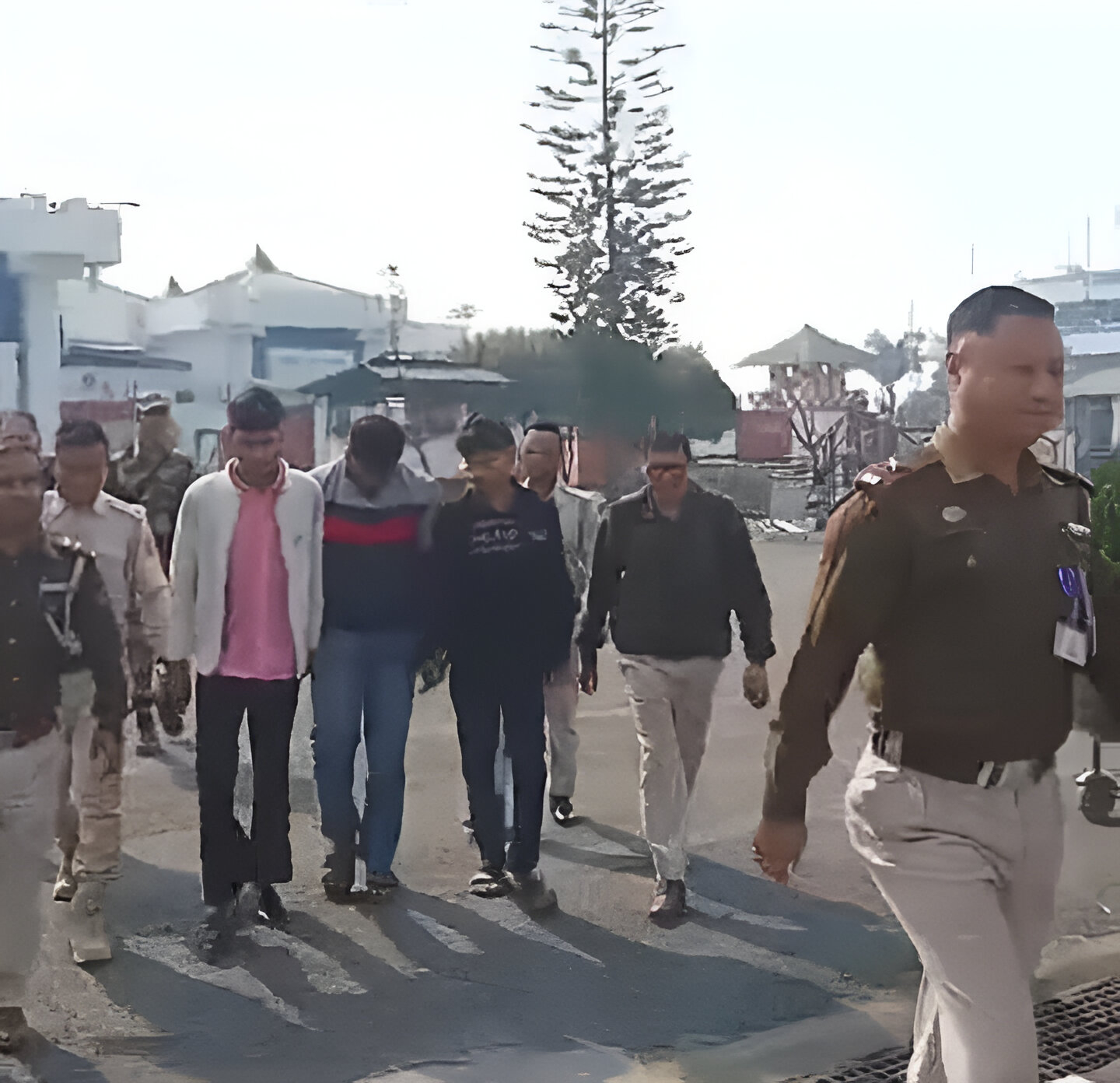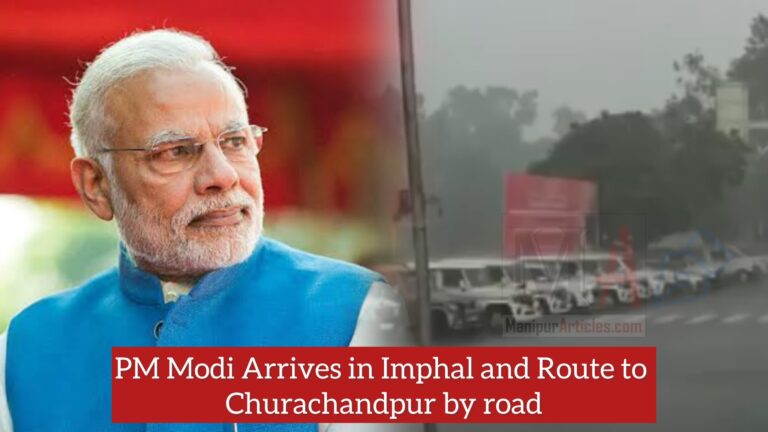Three Arrested for Fraudulent Calls to Influence MLAs in Manipur
Summary
In a recent development in Manipur, authorities arrested three individuals suspected of making fraudulent phone calls with the intention of influencing MLAs. This incident, which has raised serious questions about political interference and the misuse of communication channels, highlights both the vulnerability of political systems to modern-day scams and the urgent need for stringent measures to safeguard democratic processes.
Introduction
Imagine receiving a call that seems harmless at first, only to realize that the voice on the other end is trying to manipulate political opinions or even influence crucial decisions. In Manipur, such a scenario unfolded as three individuals were arrested for making fraudulent calls aimed at swaying the opinions of Members of Legislative Assembly (MLAs). Today, we’re diving deep into this case, exploring the details, implications, and broader context of fraudulent communication attempts in our political landscape.
Fraud is not just a buzzword—it’s a multifaceted challenge that affects us all. When fraud targets the political arena, it shakes the very foundation of trust we place in our democratic institutions. In this article, we’ll break down what happened in Manipur, how it affects the political process, and what steps can be taken to prevent similar incidents in the future.
The Fraudulent Calls Incident
Fraudulent calls are on the rise, and their implications are more severe when they target influential political figures. In Manipur, the news broke that three individuals were apprehended for allegedly making deceptive phone calls intended to influence MLAs. But what exactly does “influencing MLAs” mean, and why does it matter so much?
Fraudsters often rely on the element of surprise and manipulation. In this case, the culprits used deceptive tactics to persuade MLAs, potentially affecting decisions that could have broader policy impacts. They might have pretended to be key figures or influential stakeholders, weaving a narrative that played on the MLAs’ concerns or aspirations. The result? A dangerous mix of misinformation and undue influence that can undermine the decision-making process in legislative assemblies.
It’s akin to a magician’s sleight of hand—while the audience is dazzled by the trick, the reality behind the illusion remains hidden. When it comes to political influence, however, the stakes are far higher than mere applause.
The Investigation and Arrests
The investigation into these fraudulent calls was swift and thorough. Law enforcement agencies in Manipur, taking into account the sensitive nature of the allegations, meticulously gathered evidence linking the suspects to the fraudulent activities. The arrest of the three individuals marks a significant step in curbing attempts to manipulate political outcomes through illicit means.
Authorities believe that these fraudsters might have exploited loopholes in communication protocols or taken advantage of insufficient verification systems within the political framework. The investigation revealed that the calls were not random but part of a more calculated strategy to interfere with political processes. It serves as a wake-up call for the government and regulatory bodies to tighten the reins on how communication tools are used and monitored.
Imagine trying to piece together a puzzle where every call is a fragment of a larger scheme—this investigation was exactly that. The successful apprehension of these individuals not only disrupts their current operations but also sends a clear message: fraudulent attempts to influence political decisions will not be tolerated.
Political Implications
Political influence through fraudulent means is a grave concern. In a democracy, every voice matters, and every decision taken by our elected representatives should be free from undue pressure or manipulation. When fraudsters make unsolicited calls aimed at swaying MLAs, it directly undermines the integrity of the legislative process.
Political parties and policymakers need to ask themselves: What happens when decisions are influenced by illegitimate channels? How can the trust of the people in the system be restored if such tactics become common practice? These are not just theoretical questions; they are real challenges that can destabilize governance if not addressed promptly.
Fraudulent calls have the potential to distort the democratic process, causing policies to favor a few rather than representing the collective will of the people. Just as a small crack in a dam can eventually lead to a catastrophic collapse, even minor instances of fraud in politics can have disproportionate and long-lasting impacts.
Community Reaction
The news of these arrests has resonated deeply with the community in Manipur. Residents, local political figures, and even ordinary citizens have expressed concern over how such fraudulent activities could compromise the trust placed in elected officials. There is a shared sentiment of disbelief that anyone would go to such lengths to manipulate political decisions.
Social media platforms have been abuzz with discussions, with many questioning the efficiency of the current system and calling for stronger regulatory measures. The emotional response from the community is understandable—after all, democracy is built on the pillars of trust, transparency, and accountability. When these pillars are threatened, it affects everyone, from the highest-ranking official to the average voter.
It’s almost like watching a suspense thriller unfold in real life—every twist and turn in the investigation brings with it a mix of intrigue and anxiety about what the future might hold for political integrity.
Precedents and Similar Cases
Fraudulent calls aren’t an isolated phenomenon in Manipur. Similar tactics have been reported in various parts of the country, where scammers use their wits and technology to disrupt political processes. These incidents often serve as case studies for both law enforcement and political analysts, highlighting vulnerabilities in communication networks and the need for comprehensive regulatory frameworks.
By comparing this incident to past cases, we can see patterns emerging. In several instances, fraudsters have targeted key decision-makers in an attempt to manipulate outcomes for personal or political gain. Each case adds another layer to our understanding of how fraud operates in the modern age, emphasizing that technological advancements—while beneficial in many ways—can also be exploited for nefarious purposes.
The common thread in these cases is the exploitation of trust. Just as a con artist preys on human vulnerabilities, these individuals take advantage of the inherent trust placed in official communication channels. The lessons learned from previous incidents have spurred debates on how to balance technological progress with robust security measures.
Legal Implications and Potential Consequences
When fraudulent activities target the political sphere, the legal ramifications are both serious and far-reaching. Indian law provides stringent measures to combat fraud and political corruption, but the evolving nature of technology means that legal frameworks must continuously adapt. The arrests in Manipur highlight a significant legal precedent, showcasing that misuse of communication for political gain is a criminal offense with severe penalties.
From defamation and fraud charges to potential cases of political interference, the suspects in this case could face a range of legal consequences. The judiciary’s response to such cases will not only set an example but also serve as a deterrent to others who might consider similar tactics.
For the average citizen, these legal proceedings underscore the importance of safeguarding our democratic institutions. It’s a reminder that democracy is a collective responsibility—one that requires constant vigilance, robust legal frameworks, and proactive measures to prevent manipulation at all levels.
Think of the legal system as the referee in a high-stakes game. Just as a referee ensures fair play on the field, our legal institutions are tasked with upholding fairness and integrity in political processes. Any breach of these principles is met with swift and decisive action.
Government Response
In the wake of this incident, government officials have been quick to assure the public that measures are being taken to address and prevent similar fraudulent activities in the future. Law enforcement agencies, along with regulatory bodies, are now working on enhancing communication security protocols and developing stricter guidelines for political interactions via telephone and digital platforms.
Policy makers are exploring the integration of advanced technology to detect and prevent fraudulent calls. This includes better caller verification systems and more robust tracking of suspicious activities. The government’s proactive stance is intended to rebuild trust in the political process and reassure citizens that their representatives are making decisions free from external manipulations.
It’s like upgrading from an old lock to a state-of-the-art security system—ensuring that every potential breach is met with an immediate and effective countermeasure. These initiatives not only aim to protect the integrity of political processes but also serve as a catalyst for broader reforms in communication security and transparency.
How Fraudulent Calls Affect Democracy
At its core, democracy relies on informed decision-making and transparent communication. When fraudulent calls are used to influence MLAs, it creates a ripple effect that undermines these very foundations. Decisions made under the influence of fraud are not truly representative of the public will, and they erode trust in the democratic system.
Imagine a town hall meeting where some voices are amplified by hidden microphones while others are muted. The outcome of such a meeting would hardly reflect the collective opinion of the community. In a similar vein, fraudulent calls distort the decision-making process by injecting false narratives and manipulative tactics into political discourse.
The real danger lies in the gradual erosion of trust. When citizens begin to believe that their elected representatives are being manipulated by unseen forces, it weakens the bond between the government and the governed. The concept of a fair and just society hinges on transparency, accountability, and trust—values that are compromised when fraudulent activities seep into the political realm.
Preventive Measures and Awareness
Prevention is always better than cure, and the recent incident in Manipur serves as a catalyst for rethinking our approach to fraud prevention in politics. Awareness campaigns, improved communication protocols, and technological interventions are all part of the solution.
- Enhanced Verification Processes:
Political parties and government bodies are now considering the implementation of multi-factor authentication for sensitive communications. This means that every call, email, or digital communication involving political decisions must be verified through multiple channels to ensure its authenticity. - Public Awareness Campaigns:
Educating MLAs and other political figures about the signs of fraudulent communication is crucial. Regular workshops and training sessions can help them identify and report suspicious activities promptly. When everyone is aware of the potential threats, the entire system becomes more resilient. - Technological Innovations:
Advancements in AI and machine learning can be leveraged to detect patterns associated with fraudulent calls. These technologies can flag unusual activity in real time, enabling law enforcement to intervene before significant damage is done. - Strengthened Legal Frameworks:
Lawmakers are considering amendments to existing laws to cover the nuances of modern fraud. By closing loopholes and ensuring that penalties are severe enough to act as a deterrent, the government hopes to curb the incidence of fraudulent political communications.
These measures work together like the components of a well-oiled machine—each part is crucial for the overall functionality and security of our democratic processes.
Future Outlook
Looking ahead, the incident in Manipur is likely to spark further debates on how best to protect the sanctity of political processes. The blend of technology and politics is a double-edged sword: while it offers unprecedented opportunities for engagement and transparency, it also opens the door to sophisticated forms of manipulation.
- Policy Reforms:
We can expect policymakers to revisit and revise existing protocols surrounding political communications. This might include new regulations specifically designed to monitor and control the use of digital platforms in political discourse. - Technological Integration:
The future may see a deeper integration of technology in preventing fraud. From advanced caller authentication systems to blockchain-based tracking of political communications, technology will play a pivotal role in safeguarding democratic institutions. - Public-Private Partnerships:
Collaboration between government bodies and private tech companies could lead to innovative solutions for fraud prevention. Such partnerships can facilitate the development of state-of-the-art security measures while ensuring that the technology remains accessible and effective. - Increased Transparency:
As the government takes proactive steps to prevent fraud, transparency in political processes is likely to increase. Regular audits, public reports on communication security, and enhanced oversight can restore faith in the system and ensure that political decisions are made without undue external influence.
Ultimately, the journey toward a fraud-free political environment is ongoing. Just as we continuously update our devices and software to fend off cyber threats, our political systems must evolve to meet the challenges of the digital age.
Conclusion
The arrest of three individuals in Manipur for making fraudulent calls intended to influence MLAs is more than just a local news story—it is a mirror reflecting the broader challenges of maintaining integrity in our democratic processes. Fraudulent calls, especially when used to manipulate political decisions, pose a serious threat to the foundation of trust that our society is built upon.
Through vigilant investigations, robust legal action, and the proactive measures outlined above, we can work towards a future where such manipulative tactics are a thing of the past. The incident reminds us that every component of our democracy, from individual MLAs to government agencies, must remain vigilant and committed to transparency and accountability.
In our interconnected world, where a single call can potentially sway decisions that affect thousands, it is imperative that both the government and the public join hands to protect our democratic values. The story from Manipur is a call to action—a reminder that while technology brings us closer together, it also demands that we remain ever-watchful against those who seek to exploit it for personal gain.
Let’s take this as an opportunity to re-evaluate our communication systems, strengthen our legal frameworks, and ensure that every vote, every decision, and every voice remains free from undue influence. After all, democracy thrives on trust, and it is up to all of us to nurture and protect that trust.
FAQs
- What were the fraudulent calls in Manipur about?
The fraudulent calls were designed to manipulate and influence MLAs by providing false or misleading information, thereby potentially affecting political decisions and outcomes. - How did law enforcement identify and arrest the suspects?
Authorities conducted a thorough investigation by monitoring communication channels and tracing suspicious activities, which ultimately led to the arrest of the three individuals involved. - What legal charges could the arrested individuals face?
The suspects may face charges ranging from fraud and defamation to political interference, as per the stringent laws in place to protect democratic processes in India. - What measures are being considered to prevent similar incidents in the future?
Proposed measures include enhanced verification processes, public awareness campaigns, the integration of advanced technologies like AI for real-time monitoring, and the strengthening of legal frameworks to close existing loopholes. - How can the public help in safeguarding democratic processes against such frauds?
By staying informed, reporting suspicious activities, and supporting initiatives for greater transparency and accountability, citizens can play an active role in protecting the integrity of our democratic institutions.



